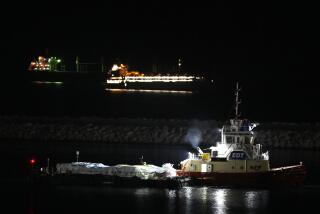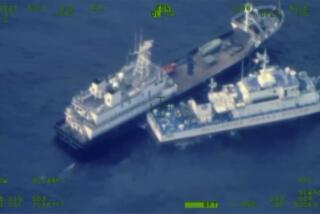Philippines Will Consider Offshore U.S. Military Depot : Asia: President Ramos to discuss topic with Clinton during first visit by an American head of state since 1975.
- Share via
MANILA — On the eve of talks with President Clinton, Philippine President Fidel V. Ramos said Saturday that his country might consent to having the United States set up nearby the kind of floating military depot the Pentagon says it badly needs for regional crises.
Ramos stressed that the idea has already been formally rejected by Thailand and that it would need to go through several stages of consideration by Filipino and U.S. officials. But he also indicated that, at a time when he is trying to cultivate stronger U.S. economic ties, he did not want to reject the idea out of hand.
“I’ve not seen any formal proposal . . . but looking at this at a working level is a possibility,” Ramos said in an interview at Malacanang Palace.
The idea is likely to be highly controversial in the Philippines, which two years ago voted to eject U.S. troops from two colonial-era military bases, and where many citizens remain suspicious of U.S. intentions. That was demonstrated Saturday, when several hundred supporters of the leftist federation Sanlakas marched toward Clinton’s hotel, shouting their opposition to any such agreement.
They yelled “Clinton out!” and called Ramos a “puppet” until they were dispersed by tear gas and water cannons.
The first U.S. President to visit the 7,000-island archipelago since Gerald Ford in 1975, Clinton and his wife, Hillary, arrived to a low-key ceremony at Ninoy Aquino Airport near midnight local time.
At talks with Clinton today, Ramos is expected to strongly stress that the country needs more American investment if it is to continue its recent economic growth and stability.
Clinton will also commemorate the joint World War II sacrifices of the Filipino and U.S. Army forces in appearances at the huge U.S. military cemetery in Manila and the Corregidor battle site in Manila Bay.
Tonight, Clinton heads to Jakarta, Indonesia, for talks with Asian leaders and a meeting of the Asia-Pacific Economic Cooperation forum.
Pentagon officials would like to have a floating depot where they could store enough equipment and supplies to sustain one heavy brigade for 15 days, for military or disaster relief operations in the Mideast or the Korean peninsula.
As proposed to Thai officials, the plan would include up to 850,000 square feet of storage for equipment that would include M-1A1 Abrams tanks and M-2A2 Bradley fighting vehicles.
The gear would be stored on half a dozen huge ships or barges outside territorial limits. Some maintenance would be required, but the plan envisions no need for accompanying troops.
Thailand turned down the proposal. “Establishing any armed depot in the Gulf of Thailand could lead to misunderstanding among other countries of the region,” a spokesman for the Thai government said. He was presumably referring to China, which with its great size and growing power is a source of anxiety to many governments in the region.
Indonesia and Malaysia are also reportedly wary of the plan, although State Department officials say they were never formally asked.
Indonesian Foreign Minister Ali Abdullah Alatas has been quoted as saying that the balance of a U.S. presence in Asia is needed, but not in the form of military bases. Negative reactions by Indonesia and Malaysia may have also been prompted by their unwillingness to be a party in any military action against an Islamic country in the Middle East.
In his interview, Ramos stressed the continuing strong mutual security commitments of the United States and the Philippines, noting that the two had recently conducted joint military exercises and that the Philippines had supported U.S. actions in Haiti and elsewhere.
“We have been responsive,” said Ramos, a West Point-trained soldier who formerly directed the Philippine armed forces. “We have supported U.S. and U.N. peacekeeping initiatives.”
Ramos said any plan for a floating depot would need to go before a review board of U.S. and Filipino officials that was set up under a mutual security treaty in 1951. The plan would then be reviewed by U.S. and Filipino diplomatic officials and considered by the legislature and other government agencies.
U.S. and Philippine officials last week announced a new agreement that will allow their warships to refuel and pick up food supplies in each other’s countries.
Despite some Filipinos’ anxieties about U.S. influence in the region, Ramos has been pitching hard his desire for more U.S. investment to lift a country that is only slowly coming out of the setbacks of the era of President Ferdinand E. Marcos. The Philippines’ growth rate has recently risen to about 4%, but unemployment is high, and the country desperately needs infrastructure improvements.
But the nervousness of some Filipinos has been evident this weekend in demonstrations to publicize charges that the United States did not clean up environmental damage at the bases before pulling out its thousands of GIs.
The talks between Clinton and Ramos may include other sensitive subjects related to the U.S. troop presence in the country. There is substantial domestic pressure for Ramos to bring up the financial claims of former Filipino soldiers who fought alongside the United States, and of the Amerasian children of American GIs formerly stationed in the Philippines.
More to Read
Sign up for Essential California
The most important California stories and recommendations in your inbox every morning.
You may occasionally receive promotional content from the Los Angeles Times.














